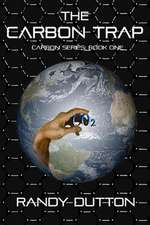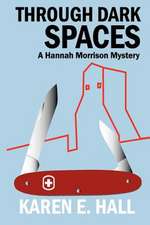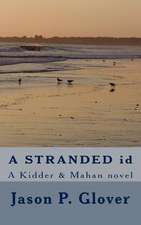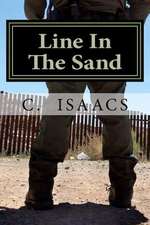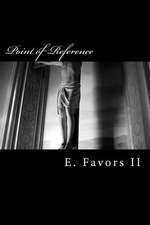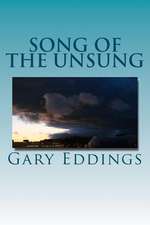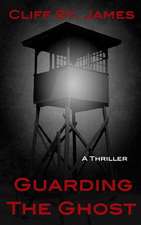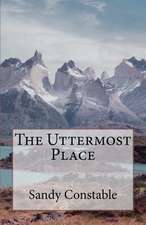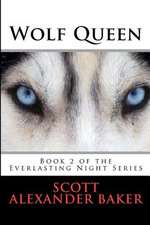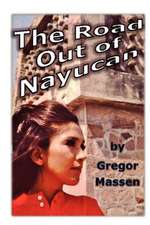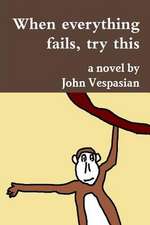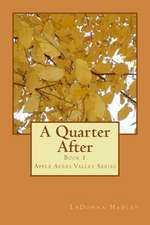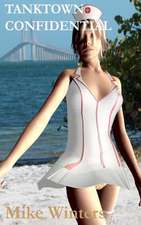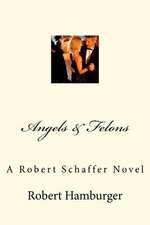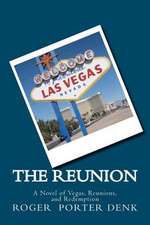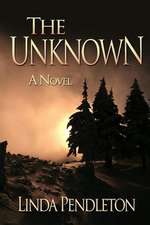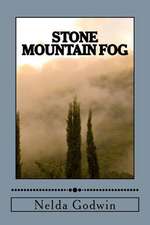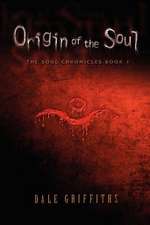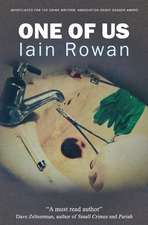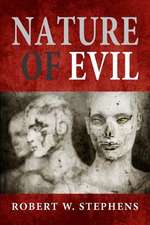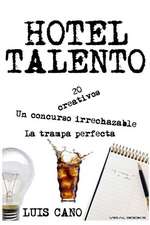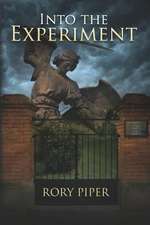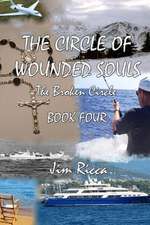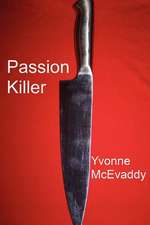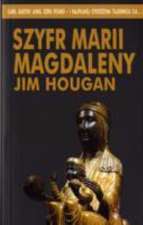Kingdom Come
Autor Jim Houganen Limba Engleză Paperback – 2 ian 1995
After someone he has under surveillance is literally slaughtered, CIA agent Jack Dunphy is immediately ordered to leave London and return to the U.S., where he is dumped into a tedious desk job that seems calculated to make him quit. Determined to learn why, Dunphy uses all his CIA tradecraft on the agency that has turned against him–and hears the fragments of a story that seems too wild to be true . . . providing him with damning evidence of a vast conspiracy deeply entrenched within the CIA. Embroiled in a plot far more elaborate than he ever could have imagined, with players too powerful and consequences too deadly, Dunphy must uncover the shocking truth–even if it kills him.
KINGDOM COME
From the Paperback edition.
Preț: 157.76 lei
Nou
Puncte Express: 237
Preț estimativ în valută:
30.19€ • 31.52$ • 24.93£
30.19€ • 31.52$ • 24.93£
Carte tipărită la comandă
Livrare economică 11-17 aprilie
Preluare comenzi: 021 569.72.76
Specificații
ISBN-13: 9780345482310
ISBN-10: 034548231X
Pagini: 384
Dimensiuni: 140 x 216 x 22 mm
Greutate: 0.49 kg
Editura: Ballantine
Colecția Ballantine Books
ISBN-10: 034548231X
Pagini: 384
Dimensiuni: 140 x 216 x 22 mm
Greutate: 0.49 kg
Editura: Ballantine
Colecția Ballantine Books
Notă biografică
Jim Hougan has won awards for his investigative journalism. He is the author of three nonfiction books: Decadence, about the sixties into seventies; Spooks, about the American intelligence community; and Secret Agenda about Watergate. An Alicia Patterson and Rockefeller Foundation fellow, Hougan is the former Washington Editor of Harper's Magazine. He has also reported for National Public Radio's All Things Considered, and produced documentary films for Frontline, 60 Minutes, A&E, and the Discovery Channel. He lives in Afton, Virginia.
From the Hardcover edition.
From the Hardcover edition.
Extras
PROLOGUE
2 May 1945
Northern Italy
Major Angleton floated through the moonless heavens above Sant' Ambrogio, suspended in the night air by nylon cords and a canopy of black silk. He could see a line of fire burning along the forested ridge above the town, and wondered whether lightning or bombers were its cause. There was little else that he could see, still less to be heard, and only the wind to feel.
To build the city of Dioce whose
terraces are the colour of stars.
As he drifted lower, the smell of woodsmoke came at him from the nearby fires, a whiff of hyacinths and the fragrance of scrub pines. The pines were shadows, swelling against the dark hillside, until, quite suddenly, he was among them, falling past them, flying laterally across the face of the hill. And then, with a shock, he was on the ground, staggering forward on his heels, pulling against
the chute, rolling it up. The air was cool.
The major's destination was a large and crumbling villa set amid ruined terraces on the slopes above where he'd landed. A soft yellow light spilled from the villa's windows, gilding the untended vineyards that sprawled in every direction. Major Angleton unholstered his .45 and began walking up the hill until he felt the crunch of gravel underfoot and knew that he was in the courtyard. Crossing to a shuttered window, he peered between the slats. The man whom he'd been sent to find, reviled at home and hated in Europe, a poet of inestimable talents and a violent baiter of the Jews, sat at a worm-eaten library table, surrounded by books. He was writing by the light of a kerosene lantern in what appeared to be an enormous, leather diary. Behind him, hanging askew from the cracked plaster wall, was a painting of Poussin's, a small and wonderful oil in a cheap wooden frame.
A soft breeze brought the scent of wisteria with it, and Major Angleton realized that he had been holding his breath, though he didn't know for how long. The hand with the gun was clammy with perspiration.
Leaving the window, he went to the villa's door, sucked the cold night air into his lungs, pushed the door open, and stepped inside. The poet looked up, shocked to find an armed man so suddenly in front of him. Then his eyes focused on the soldier's face, and his shock turned to incredulity. "Jim?" he asked.
Angleton nodded.
"Well ... are you here to arrest me?"
Angleton shook his head. His mouth was dry. "Helmsman," he said, dropping to one knee and lowering his eyes. "Maestro di color che sanno...."
8 May 1945
FROM: 15 Army Group
92 Division
OSS, X-2
TO: Commanding General
Mediterranean Theater of Operations
SIGNED: Maj. James J. Angleton
American civilian writer EZRA LOOMIS POUND, reference FBI cable 1723, indicted for treason by grand jury, captured by Italian partisans 6 May at Sant' Ambrogio. Held MTOUSA Disciplinary Training Center for confinement pending instructions on disposition. All security measures taken to prevent escape or suicide. No press. No privileges. And no interrogation.
Chapter 1
Dunphy huddled beneath the warm sheets, half-awake, his back to Clementine. He could feel the coldness of the room beyond the bed and sensed the gray London light seeping through the windows like a cloud. The time was anyone's guess. Early morning. Or late. Or afternoon. Saturday, in any case.
He mumbled something about getting up (or maybe not) and listened for her reply. "Mmmm," she murmured, then arched her back and rolled away. "Dream ... "
He sat up with a low grumble, blinking himself awake. He swung his legs from the bed, pinched the sleep from his eyes, and got to his feet. Clementine whimpered and purred behind him as he shivered his way across the cold floor to the bathroom, where he brushed and spat. Filling his cupped hands with water from the tap, he lowered his face into the cold of it. "Jesus," he gasped. And again.
"Christ!" he whispered, and taking a deep breath, shook his head like a dog.
The man in the mirror was thirty-two years old, broad-shouldered and angular. An inch over six feet, he had green eyes and straight black hair. The eyes glittered back at him from the surface of the mirror as Dunphy, dripping, pulled a towel from the rack, then buried his face in the raised letters of white pile.
Dolder Grand.
And that reminded him: he'd promised Luxembourg that he'd send a fax to Credit Suisse, inquiring about a wire transfer that had gone awry.
There was no point in shaving. It was the weekend. He could jog to work, send the fax, do a bit of paperwork, and take the Underground back to the flat in time for lunch. Returning to the bedroom, then, he pulled a ragged sweatshirt from the dresser and dragged it over his head.
Clementine remained in a fetal position, the sheets and covers bunched inefficiently above her knees. There was a quizzical look on her face as she slept, her lips slightly parted. Dunphy stood for a moment in the still, cold air of the room, wondering at her immaculate complexion, the paper-white skin brushed with pink and framed by a cascade of dark curls.
It occurred to him to make love to her then and there, but the cold had had its effect. Shivering, he pulled on a pair of sweatpants and white socks and jammed his feet into his running shoes. As he tied the laces, his eyes never left the soft parabola of hip beneath the sheets.
Clementine shifted, turning onto her back. Dunphy stood. Maybe later--unless, as seemed likely, she'd returned to her own place.
A sigh ran through him as he went out the door.
Running was important to him. Though his life in London was a good one, it was suffused with a low-voltage anxiety that never really went away. He lived with a constant static charge of tension and a slight adrenal drain--the consequence, he knew, of spending his days in the cheap suit of a false identity.
So he ran.
He ran five times a week, about ten kilometers a day, following the same route from his apartment in Chelsea past the houseboats at Cheyne Walk, along the Embankment and across the Albert Bridge. This was the unpleasant part of the run. Even on Saturday mornings, the air was heavy with diesel fumes, the streets choked with trucks--lorries, he reminded himself--and cabs. There were a dozen streets to cross before he reached the Embankment, and, all in all, it was a dangerous way to stay in shape. Even after a year in England, Dunphy instinctively looked to the left for cars--which, of course, bore down upon him, horns blaring, from the right.
The middle of the run was lovely, though. It took him into Battersea Park, along the south bank of the Thames, and past the park's improbable pagoda. There was a sort of wildlife refuge among the trees, too pretty to be called a zoo. It held spotted deer and sheep, and a herd of wallabies that looked for all the world like prehistoric rabbits.
In the early morning stillness and gloom, the wallabies reminded him of the statues on Easter Island, immobile against the hillside, gazing down at him with stony indifference. Dunphy smiled as he strode past the beasts, moving easily and with the virtuous feeling that the passing miles gave.
This was the midpoint of his run, the place where he usually returned home the way that he had come. Today, however, he continued on through the park to Chelsea Bridge, across the Thames, and on to Millbank, heading toward his office in Gun House.
It was bad tradecraft to run the same route every day but, then again, this was London, not Beirut. Running through the park, Dunphy was entirely at ease, not only with himself, but with the person that he was pretending to be.
A light mist settled on him as he ran, soaking his sweatshirt, but never quite coalescing into rain. He was listening to the sound of his breathing and thinking about Clementine.
He'd seen her for the first time only three months before, standing behind the cash register in a used bookstore on Sicilian Avenue, the one with the funny name. Skoob.
And though Dunphy was not one to hustle clerks in bookstores, he'd known at a glance that if he didn't talk to her (or as Merry Kerry would put it, if he didn't chat her up), he'd never forgive himself. It wasn't just that she was beautiful, or that she had the longest waist he'd ever seen. It wasn't just that, he told himself. There was something else, a sweet vulnerability that made him feel guilty for the cover story that he'd given her, and for the fact that when she whispered his name, it wasn't really his name, but an alias.
He'd make it up to her, he told himself, though he couldn't say how. Coming upon Grosvenor Road, with his mind adrift in the Eden between Clementine's navel and her knees, Dunphy glanced to the left and, striding out into the street, set off a fugue of horns and shrieking brakes that startled him into a reflexive sprint. A column of cars, taxis, buses, and trucks, approaching from the right, slammed on their brakes and, shuddering to a stop, erupted in curses.
Dunphy waved ambiguously and kept on running, irritated with himself for succumbing to distraction. You have to be careful, he thought. In the business he was in, it was easy enough to get blindsided.
From the Hardcover edition.
2 May 1945
Northern Italy
Major Angleton floated through the moonless heavens above Sant' Ambrogio, suspended in the night air by nylon cords and a canopy of black silk. He could see a line of fire burning along the forested ridge above the town, and wondered whether lightning or bombers were its cause. There was little else that he could see, still less to be heard, and only the wind to feel.
To build the city of Dioce whose
terraces are the colour of stars.
As he drifted lower, the smell of woodsmoke came at him from the nearby fires, a whiff of hyacinths and the fragrance of scrub pines. The pines were shadows, swelling against the dark hillside, until, quite suddenly, he was among them, falling past them, flying laterally across the face of the hill. And then, with a shock, he was on the ground, staggering forward on his heels, pulling against
the chute, rolling it up. The air was cool.
The major's destination was a large and crumbling villa set amid ruined terraces on the slopes above where he'd landed. A soft yellow light spilled from the villa's windows, gilding the untended vineyards that sprawled in every direction. Major Angleton unholstered his .45 and began walking up the hill until he felt the crunch of gravel underfoot and knew that he was in the courtyard. Crossing to a shuttered window, he peered between the slats. The man whom he'd been sent to find, reviled at home and hated in Europe, a poet of inestimable talents and a violent baiter of the Jews, sat at a worm-eaten library table, surrounded by books. He was writing by the light of a kerosene lantern in what appeared to be an enormous, leather diary. Behind him, hanging askew from the cracked plaster wall, was a painting of Poussin's, a small and wonderful oil in a cheap wooden frame.
A soft breeze brought the scent of wisteria with it, and Major Angleton realized that he had been holding his breath, though he didn't know for how long. The hand with the gun was clammy with perspiration.
Leaving the window, he went to the villa's door, sucked the cold night air into his lungs, pushed the door open, and stepped inside. The poet looked up, shocked to find an armed man so suddenly in front of him. Then his eyes focused on the soldier's face, and his shock turned to incredulity. "Jim?" he asked.
Angleton nodded.
"Well ... are you here to arrest me?"
Angleton shook his head. His mouth was dry. "Helmsman," he said, dropping to one knee and lowering his eyes. "Maestro di color che sanno...."
8 May 1945
FROM: 15 Army Group
92 Division
OSS, X-2
TO: Commanding General
Mediterranean Theater of Operations
SIGNED: Maj. James J. Angleton
American civilian writer EZRA LOOMIS POUND, reference FBI cable 1723, indicted for treason by grand jury, captured by Italian partisans 6 May at Sant' Ambrogio. Held MTOUSA Disciplinary Training Center for confinement pending instructions on disposition. All security measures taken to prevent escape or suicide. No press. No privileges. And no interrogation.
Chapter 1
Dunphy huddled beneath the warm sheets, half-awake, his back to Clementine. He could feel the coldness of the room beyond the bed and sensed the gray London light seeping through the windows like a cloud. The time was anyone's guess. Early morning. Or late. Or afternoon. Saturday, in any case.
He mumbled something about getting up (or maybe not) and listened for her reply. "Mmmm," she murmured, then arched her back and rolled away. "Dream ... "
He sat up with a low grumble, blinking himself awake. He swung his legs from the bed, pinched the sleep from his eyes, and got to his feet. Clementine whimpered and purred behind him as he shivered his way across the cold floor to the bathroom, where he brushed and spat. Filling his cupped hands with water from the tap, he lowered his face into the cold of it. "Jesus," he gasped. And again.
"Christ!" he whispered, and taking a deep breath, shook his head like a dog.
The man in the mirror was thirty-two years old, broad-shouldered and angular. An inch over six feet, he had green eyes and straight black hair. The eyes glittered back at him from the surface of the mirror as Dunphy, dripping, pulled a towel from the rack, then buried his face in the raised letters of white pile.
Dolder Grand.
And that reminded him: he'd promised Luxembourg that he'd send a fax to Credit Suisse, inquiring about a wire transfer that had gone awry.
There was no point in shaving. It was the weekend. He could jog to work, send the fax, do a bit of paperwork, and take the Underground back to the flat in time for lunch. Returning to the bedroom, then, he pulled a ragged sweatshirt from the dresser and dragged it over his head.
Clementine remained in a fetal position, the sheets and covers bunched inefficiently above her knees. There was a quizzical look on her face as she slept, her lips slightly parted. Dunphy stood for a moment in the still, cold air of the room, wondering at her immaculate complexion, the paper-white skin brushed with pink and framed by a cascade of dark curls.
It occurred to him to make love to her then and there, but the cold had had its effect. Shivering, he pulled on a pair of sweatpants and white socks and jammed his feet into his running shoes. As he tied the laces, his eyes never left the soft parabola of hip beneath the sheets.
Clementine shifted, turning onto her back. Dunphy stood. Maybe later--unless, as seemed likely, she'd returned to her own place.
A sigh ran through him as he went out the door.
Running was important to him. Though his life in London was a good one, it was suffused with a low-voltage anxiety that never really went away. He lived with a constant static charge of tension and a slight adrenal drain--the consequence, he knew, of spending his days in the cheap suit of a false identity.
So he ran.
He ran five times a week, about ten kilometers a day, following the same route from his apartment in Chelsea past the houseboats at Cheyne Walk, along the Embankment and across the Albert Bridge. This was the unpleasant part of the run. Even on Saturday mornings, the air was heavy with diesel fumes, the streets choked with trucks--lorries, he reminded himself--and cabs. There were a dozen streets to cross before he reached the Embankment, and, all in all, it was a dangerous way to stay in shape. Even after a year in England, Dunphy instinctively looked to the left for cars--which, of course, bore down upon him, horns blaring, from the right.
The middle of the run was lovely, though. It took him into Battersea Park, along the south bank of the Thames, and past the park's improbable pagoda. There was a sort of wildlife refuge among the trees, too pretty to be called a zoo. It held spotted deer and sheep, and a herd of wallabies that looked for all the world like prehistoric rabbits.
In the early morning stillness and gloom, the wallabies reminded him of the statues on Easter Island, immobile against the hillside, gazing down at him with stony indifference. Dunphy smiled as he strode past the beasts, moving easily and with the virtuous feeling that the passing miles gave.
This was the midpoint of his run, the place where he usually returned home the way that he had come. Today, however, he continued on through the park to Chelsea Bridge, across the Thames, and on to Millbank, heading toward his office in Gun House.
It was bad tradecraft to run the same route every day but, then again, this was London, not Beirut. Running through the park, Dunphy was entirely at ease, not only with himself, but with the person that he was pretending to be.
A light mist settled on him as he ran, soaking his sweatshirt, but never quite coalescing into rain. He was listening to the sound of his breathing and thinking about Clementine.
He'd seen her for the first time only three months before, standing behind the cash register in a used bookstore on Sicilian Avenue, the one with the funny name. Skoob.
And though Dunphy was not one to hustle clerks in bookstores, he'd known at a glance that if he didn't talk to her (or as Merry Kerry would put it, if he didn't chat her up), he'd never forgive himself. It wasn't just that she was beautiful, or that she had the longest waist he'd ever seen. It wasn't just that, he told himself. There was something else, a sweet vulnerability that made him feel guilty for the cover story that he'd given her, and for the fact that when she whispered his name, it wasn't really his name, but an alias.
He'd make it up to her, he told himself, though he couldn't say how. Coming upon Grosvenor Road, with his mind adrift in the Eden between Clementine's navel and her knees, Dunphy glanced to the left and, striding out into the street, set off a fugue of horns and shrieking brakes that startled him into a reflexive sprint. A column of cars, taxis, buses, and trucks, approaching from the right, slammed on their brakes and, shuddering to a stop, erupted in curses.
Dunphy waved ambiguously and kept on running, irritated with himself for succumbing to distraction. You have to be careful, he thought. In the business he was in, it was easy enough to get blindsided.
From the Hardcover edition.
Recenzii
“[AN] INTELLIGENT AND PULSE-POUNDING THRILLER . . .
Hougan demonstrates fine command of his material.
His familiarity with the ways of spies permeates his novel.
Better yet, his writing is punchy and spare,
his characterizations lively.”
–Publishers Weekly
From the Paperback edition.
Hougan demonstrates fine command of his material.
His familiarity with the ways of spies permeates his novel.
Better yet, his writing is punchy and spare,
his characterizations lively.”
–Publishers Weekly
From the Paperback edition.


